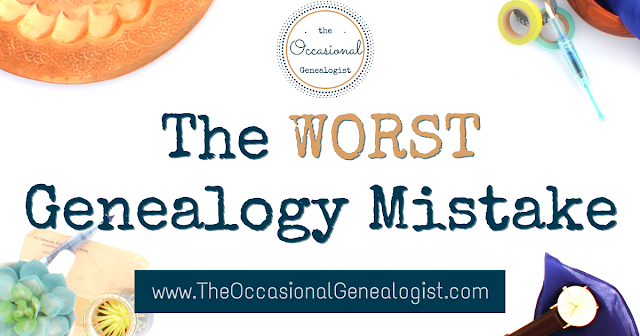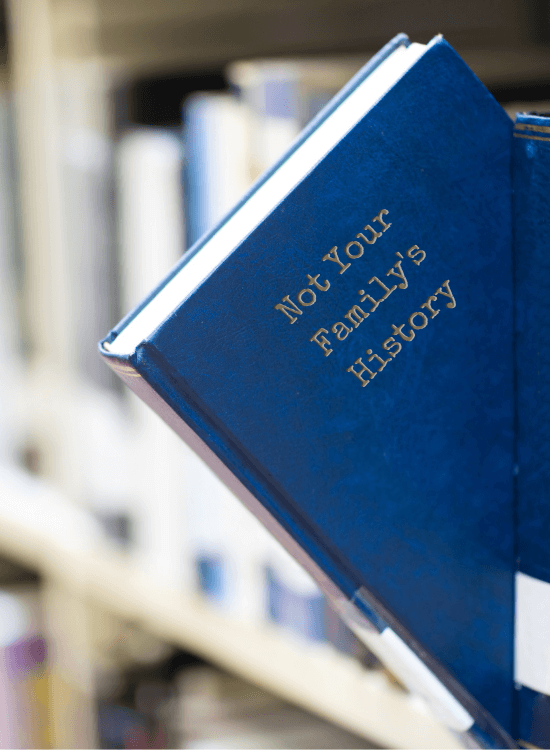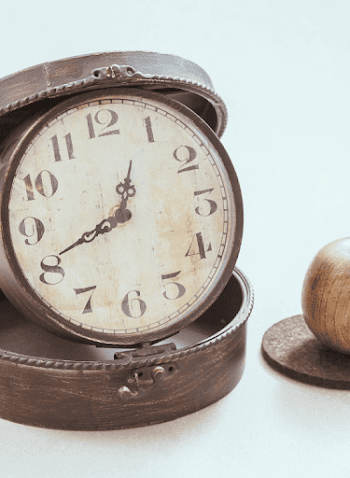Are you frustrated with your genealogy progress?
Maybe you feel stuck.
Maybe you feel confused.
Maybe you feel impatient.
There's a really good chance you're making the worst genealogy mistake. It's a really popular mistake that will leave you stuck, confused, and not progressing for YEARS.
I should know, I made this mistake and in quite a stellar fashion.

Luckily for you, because I made this mistake (and so many others) I can tell you what it is AND how to fix it or how to avoid making it at all. That's right, I've made all these mistakes so you don't have to (that's my story and I'm sticking to it).
So what is this mistake?
I can describe this mistake several ways and give it several names and they would all mean the same thing. Stick with me so you understand the mistake, not just some pithy name that you might take to mean something different.
- The worst mistake is not reviewing your existing research. You need to review it over and over again as you keep doing genealogy so if you've only reviewed it once, you're making this mistake.
- You could also say this mistake is not considering your entire genealogy, only having tunnel vision for what you are doing right this moment.
- Another way to describe the worst mistake is searching and collecting instead of researching.
These don't sound like the same mistake but they are.
Let's look at how these are all the same.
Three Genealogy Mistakes in One
When I was a much younger genealogist there was a type of genealogist you rather referred to in whispers. It was the surname collector. You didn't want to be a surname collector, that's not actually a genealogist. Most people knew a surname collector (hence the whispers, you didn't want them to overhear you talking about them).
Today, the surname collector isn't too common. Surname collecting was usually a result of doing genealogy at the local library. That meant using books of abstracted records for your research. The surname collector went through as many books as they could collecting anyone with the right surname.
Online, surname collecting isn't as common, or as easy. There are far too many resutls for any surname.
Here's how the surname collector was making the worst mistake. They were searching and collecting instead of researching. The first time I heard someone make this distinction it sort of made "research" click.
But online research has actually made the mistake more prevalent, although the name for doing this should be different.
Surname collecting grew your file folders but not your family tree because you couldn't fit all those names into the tree. Online research can grow your tree by leaps and bounds so you likely don't realize you're making this mistake, until it's too late.
Unfortunately, the way online sites (with a tree option) work, they slot your search results neatly into your tree and then suggerst some ancestors for that person. Your tree grows, grows, grows. But that doesn't mean the information is correct. You may be building someone else's family tree without even realizing it.
Fitting the right name into your tree, without reviewing, is searching, not researching. This is just like being too focused on what you're doing right now. You aren't considering what's happened before, i.e. what else you've found. And both of these happen because you're not reviewing. They are all the same mistake. You can't see the forest through the trees and the easy fix is to review your work—review everything related to your current project.
Let me tell you why this is so important through the example of my stellar mistake.
Starting with a Family Tree
I started genealogy long before online research was possible, but I actually started in a similar manner to what most people do today.
I was given a copy of a family manuscript provided by a cousin who had done research. It covered the branch of the family we shared. This was like starting with an online tree.
This manuscript came from our Ledford branch and went all the way to me and my sister. It covered my 3rd great-grandparents Ledford, my 4th great-grandparents Godfrey (that's Mrs. Ledford's parents), and my 5th great-grandparents Bradley (Mrs. Godfrey's parents). That's a pretty good place for a young genealogist to start!
Since I had this manuscript that provided so much, I worked on my maiden name branch and also my paternal great-grandmother's family. My paternal grandmother did not want to be researched so that means I focused on 3 of my 16 great-great-grandparent branches (the family manuscript followed the 2nd great-grandmother in the maiden name branch). My maternal grandmother also did genealogy so I didn't worry about the maternal side at all.

So that was it, I had just two surnames to focus on initially, the branches coming from my paternal grandfather. For a number of years I'd just bounce back and forth between those two branches moving from one to the other whenever I got stuck.
What To Do When Your Genealogy Is Stuck
Bouncing back and forth worked for years (I didn't get to research a lot, remember, no online research, plus I was a kid so I had no money to even cover postage to do long-distance genealogy).
This should sound somewhat familiar. You probably had a branch where you started with some info and didn't have to work on it. You researched some other relatives making progress even if you got temporarily stuck. It probably didn't take you years but a similar process.
So eventually I was thoroughly stuck. Not researching my maternal line by choice. Not supposed to research my father's mother's family. In that remaining quarter of my family tree I ended up stuck on an (alleged) orphan (still stuck on her, but with some clues from DNA!), her mother-in-law had an unknown maiden name (finally found it 20 years later but I'm still stuck on her, also with clues from DNA). In the remaining branch I "knew" 3rd and 4th great-grandparents and the one set of 5th great-grandparents.
So, guess it's time to start working on the people from that family manuscript!
Have You Been Researching This Way?
I had added on to some of the information over the years. The branches I had been working on were Patterson and Miller whereas the manuscript had gone back to Ledford, Godfrey, and Bradley. As you might imagine, there aren't as many Ledfords and Godfreys so I noticed when I came across those names (and they were conveniently from the same county as the Pattersons, so I did come across those names and often even the people listed in the manuscript).
Before I get to the stellar part of this mistake, here's what's different from what you may be doing...
Back in the dark ages of paper, I didn't have an online tree. Obvious, right? But here's what that means.
Traditional vs. Modern Genealogy
I had to put some effort into getting information together about a single person. I could fill in a family group sheet (which is similar to when you add someone to an online tree) but I still usually had to do a little bit of reviewing to figure out what sources to use and to determine if the information really was for the same person. A computer didn't help me out.
There were no automated hints. I wasn't presented with records for any particular ancestor. I had to figure that out.
How much attention are you paying when you add information to your online tree? Some people pay a lot of attention but far too many people just attach anything that the site they are using suggests. Perhaps you're somewhere between those two?
In the pre-online research days, I had to review information to make any progress or do research at all.
If I was reviewing, what was my stellar mistake?
I wasn't really reviewing, I was doing the bare minimum to keep making progress. Is that what you're doing?
I slapped all the ancestors from the family manuscript right into my information and just kinda looked for their parents whenever I was doing research.
This is borderline surname collecting.
Gathering and Searching vs. Research
The difference is, what I did was an efficient gathering of information. I gathered info on related surnames while using a source for a specific purpose---and I knew the families were from that area. In other words, I was using a source for a specific reason and if I came across another surname of interest, which I knew was from the same area, I also captured that information. I didn't just copy every surname of interest from every book I could get my hands on.
There was method to my collecting and what I did was efficient. It's OK to do this. That's not where I made the first of my two stellar mistakes.
I was really stuck on those 5th great-grandparents, and every other branch I was working on. So I started focusing on just the Bradleys. I carefully looked over what information I had (and maybe even tried to make a research plan, I had been researching long enough at that point I might have learned such a thing existed).
That was a real review.
Why You MUST Review Your Research
Guess what?
Mrs. Bradley was seven (7!!!!!) when Mary (Bradley) Godfrey, my ancestor, was born.
That's right, that's not her mother.
And that wasn't her father.
The family manuscript was wrong.
Their daughter Mary was a different person. All those notes I had randomly collected on that couple were not for my family! They weren't my ancestors (they aren't even related, this was NOT a case of cousins, it was two distinct branches, one from South Carolina and one from North Carolina---but I didn't know that, yet).
A very simple review of the information about this family group would have revealed a potential error at the start, due to a mother that was too young. How many years could I have been working on useful Bradley research if I had simply reviewed what I knew instead of just collecting the information?
But it doesn't end there.
This about blew my mind. I was a teenager when I made this discovery. Up until then I had trusted an adult researcher (the cousin who did the research for the manuscript) would not have made a mistake like that. I had just trusted the information.
That was a turning point in my genealogy and I got smart.
I went back and reviewed everything from that manuscript.
Guess what happened to the brick wall for my 3rd great-grandfather William Nelson Ledford?
INSTANTLY BUSTED
Did you hear that?
INSTANTLY BUSTED
I had the solution all along but because I didn't review what I had, I went YEARS with this Ledford brick wall.
This was just as stellar as the first mistake. First I couldn't be bothered to do some simple math but this time?
My 2nd great-grandparents Patterson are 2nd cousins. I didn't know that at the time.

I had already researched all of Rolin's children and knew his daughter married a Ledford but I didn't put the pieces together.
I literally didn't have to do any new research. I had all these people in my records, I just hadn't connected child to parents.
Have you put the pieces together in your family tree?
I find cases like this in other people's research all the time.
But even if you don't have a simple math error or you just missed that you should connect two people you have already researched, reviewing what you already have is the first step.
Review, Review, and Review Again
The tougher your brick wall, the better your review needs to be.
"Review" is step 2 on my Brick Wall Solution Roadmap. I created the Roadmap because I realized genealogists had no idea what to do to bust a brick wall other than constantly hunting for a source that would tell them the answer.
There are two problems with this.
- For most people in your tree, you will not find a source that directly gives you the answer you want. Yes, it has worked up until now. It might be accurate to say most people in your known tree have answers given directly by a source but are you interested in your known tree or finding the unknown ancestors?
There's still item 2, though...
- How do you know that answer is correct? The shortest way to answer that is "evidence evaluation" but explaining what that is is not short. It involves more reviewing, though.
Are you making the worst genealogy mistake?
- Are you not reviewing what you already know?
- Are you so focused on what you're searching for (not researching) that you can't see the big picture? Are you only searching and collecting information?
- Are you doing the minimum to keep growing your family tree (online trees are like kudzu, they easily grow out of control)?
- Are you sure the people in your tree are really your ancestors and the details are correct?
- Are you putting the pieces together and getting a picture of YOUR family?
Don't rely on someone else's "research" for your success. You can use research done by other people but make sure you review it. Don't just accept it as correct.
What Next?
Exactly what to do is not a quick answer I can tack on to the end of this post. Even "how to review" is not a quick answer.
The first step is recognizing you regularly need to look at the big picture and review all the information you have. The most basic "review" is gathering all your research and reading through it. Make sure you think about what it really says. I described the situation when I made my stellar mistakes to give you an idea what really happens and hopefully help you think about what you could do in such a situation.
Will reviewing your information instantly bust all your brick walls. No way! I still have tons of brick walls. I'm still stuck on most of those same ancestors. Research takes time and they're called "brick walls" because they're HARD. Most brick walls involve chipping away at the mortar for years until the wall crumbles. The less time you have for quality research, the longer it will take.
But what if you have a "fake" brick wall because you didn't put together the fact that W.N. Ledford was of an age to be John Ledford's son and both families were from the same county? (that's the only Ledford family in the county, it was a truly stellar fail) That wasn't a hard problem at all.
Review what you've already found and take notes of what you think as you look over the information, especially any questions you have. Then answer your own questions.
When I asked myself if W.N. Ledford could be related to the John Ledford family, my brick wall was busted.
Besides asking yourself questions about relationships, dates, or places, you might also ask yourself questions that require you learn something instead of doing research. That's why taking notes while you review works so well. It uncovers research that's missing as well as things you need to learn and are related to YOUR project.
Don't make the worst mistake. Put the pieces together.









